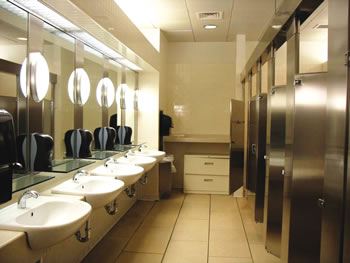Public restrooms have health risks, watch out!
Except when you are at home, the probability is that you share bathrooms with others, whether in the office, stadiums, shopping malls, restaurants, hotels, airplane, or filling stations, among others.
While this is mostly inevitable, the sad thing is that sharing such an intimate convenience facility exposes you to certain health problems.
Many people take what they consider fool-proof protection such as opening the door with the elbow, flushing before using water closet, not sitting on the seat bowl, and such like; but all these precautions don’t necessarily save you from catching some bugs that may send you to the doctor.
Indeed, scientists at an annual meeting of the Infectious Diseases Society of America reveal that samples taken from a variety of public restrooms showed a huge number of illness-causing bacteria present in such places.
They are of the opinion that even when a public washroom looks neat and smells fine, you still must not bet your dime on it. And when they are dirty or wet? Run for your life, they advise.
Savvy people, especially women, sometimes use paper seat protectors, which they spread on loo seat bowls before sitting down to use if they realise they would be spending a bit longer time there. Scientists say, however, that the ‘protection’ is more psychological than real.
Of course, doctors do say that you will escape most of these infections if your immune system is strong enough and also if you maintain simple hygiene habit such as washing your hands after each bathroom use.
This is because the germs left on the hands can be easily transferred to surfaces you touch or to your eyes, mouth, or nose – where they can make you and other people sick. “That’s why hand-washing with lots of soap and water is so important after using the convenience,” doctors say.
Again, they assure, you only need to fear if you have an open wound or lesion on your bum. But then, the fact remains that many people – especially women – have unpalatable stories to relate following a stint in public lavatory.
This, experts agree, is due to the open and rather complicated nature of the female reproductive organ, which makes women susceptible to all sorts of infection that men usually escape from.
For one, microbiologists warn that germs in faeces can be propelled into the air when you flush the toilet. Indeed, immunologists say the risk of contracting Hepatitis A, B or C – distinct diseases that affect the liver – is high in this instance.
Doctors say Hepatitis B virus is spread, among others, when blood, semen, or vaginal fluids (including menstrual blood) from an infected person enters another person’s body. As dangerous as this virus is – which is why it is a concern when using public restrooms – blood and other body fluids that contain it can remain contagious for at least a week and possibly much longer, even when they dry up.
Other airborne infections that you can contact through flushing are coughs or common cold, which can be taken into your lungs through particles that fly around after you press the lever.
As such, scientists advise that, to prevent the airborne bugs from choosing you as the landing pad, you should hurry out of the arena immediately you initiate flushing.
“The greatest aerosol dispersal occurs not during the initial moments of the flush, but rather once most of the water has already left the bowl,” says the Director of Clinical Microbiology and Diagnostic Immunology at New York University Medical Centre, Dr. Philip Tierno.
In the alternative, Tierno says, if you’re using a public toilet that doesn’t have a lid, open the door first before you flush, to enable you get out of the way of the spray as quickly as possible.
And because of the health cataclysm usually caused by flushing, public bathroom users are advised against putting their bags or any personal effects on the floor. If there’s nobody to hold your bag for you while using the restroom, they advise hanging your bag on the nail behind the door instead.
This is because the floors of public restrooms have been found to be the most germ-infested, with an alleged two million bacteria per square inch.
Streptococcus is another infection that you can get from public comfort rooms. Physicians say it is variously responsible for certain form of sore throat as well as some serious skin problems and, wait for it, pneumonia!
coli is another health scare in public powder rooms, and it is known to cause bloody diarrhoea or abdominal cramps.
Staphylococcus is another concern that one should watch against when using public convenience. It is said to be the virus behind food poisoning and a form of pneumonia.
And don’t just think the lavatory seat is the only health concern. The urinals, hand dryers and the sinks are not safe either.
Nor is the hand dryer as safe as we might wish to think! According to a study by Effect Measure, an independent group of senior public health practitioners, every time you use an air dryer, the amount of bacteria on your hands increases by 254 per cent and on the finger pads by 194 per cent!
Why is this? Experts say dryers have an internal screen that should be changed fortnightly, but this hardly happens. Consequently, more bacteria, germs, and viruses are trapped in the dust on the dryer’s screen, which is then blown directly onto your hands when you attempt to dry them. Disappointing, isn’t it?
The bottom line: think less of your bum when using public lavatory; and think more of your hands. Wash your hands thoroughly after each washroom visit!








